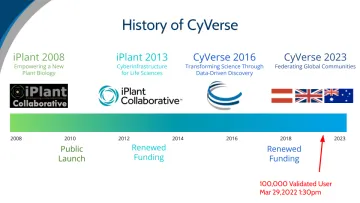Letters of Collaboration
CyVerse is pleased to provide a letters of collaboration for your proposal. Over the last ten years, approximately 40% of the proposals for which we provide a letter of collaboration have been funded. You can request a letter via email; make sure to include the letter template or text and the funding announcement number.
Text for Proposal Documents
Below are some excerpts that may be helpful when including CyVerse in your proposal. Often, the project's history or capabilities are needed to give reviewers context. Please email us for a copy of our complete Equipment and Facilities statement; we update it regularly as we continue to improve the infrastructure.
Informational Statement

CyVerse's mission is to design, deploy, and expand a national cyberinfrastructure, and train scientists in its use. CyVerse is an ecosystem of powerful extensible platforms that provide full-path data management: informatics tools, image analyses, cloud services, and resources for reproducibility, automation, and extensibility. CyVerse also provides computational training resources through tutorials, webinars, workshops, and support services.
CyVerse enables researchers to easily work across domains and institutional boundaries. By bringing your own tools, data, and workflows into CyVerse, researchers have a central, secure point where collaborators can access tools and resources. CyVerse is supported by the National Science Foundation, National Institutes of Health, U.S. Department of Agriculture, and the U.S. Department of Energy.
Facilities Statement
An NSF-funded national scale cyberinfrastructure since 2008, CyVerse supports over 125,000 registered users with over 11 petabytes of actively managed data. CyVerse supports multiple science domains and projects with advanced cloud and data engineering and data management capabilities. CyVerse excels in supporting the needs of large virtual organizations (VO) and distributed project teams that span multiple academic institutions, governmental agencies, commercial partners and consortiums.
Projects such as the NSF and USDA National AI Institute in Resilient Agriculture (AIIRA) and multiple National Synthesis Centers that bring together domain and computational scientists for solving complex problems rely on CyVerse to support their VO’s needs for sharing data, computation and community-facing products and tools. CyVerse provides services for user identity management (authentication, authorization), single sign-on,) a web-based data science workbench (the Discovery Environment [DE]), Data Store (DS, a federated data management platform) and CACAO, a cloud automation and continuous analysis platform.
CyVerse’s primary data and compute infrastructure resides at UArizona, with dedicated HPC and data replication and redundancy provided through the Texas Advanced Computing Center (TACC) in Austin, TX. DE has application integration to directly send computationally intensive tasks to TACC HPC systems via TAPIS API or Open Science Grid (OSG) via condor flocking mechanism. The physical infrastructure is housed at the UArizona Research Data Center (RDC) which is a restricted access facility with redundant power, cooling, and 24/7 monitoring. CyVerse’s data grid comprises over 11 PB of actively managed storage using iRODS, and is geographically distributed. A production Kubernetes cluster with 1052 cpu cores, 21 GPUs, 7.68TB of RAM, and 191TB of local storage. The cloud infrastructure (OpenStack) contains 1192 cores with 16TB of RAM and 428TB Ceph Storage. A condor pool (612 cores) provides access for rapid turnaround tasks. A modest dedicated virtualization cluster (224 cores) is primarily utilized for persistent hosting of web applications and databases.
Background Statement

CyVerse was originally created by the National Science Foundation in 2008 with the name iPlant Collaborative to serve U.S. plant science communities. From its inception, iPlant quickly grew into a mature organization, providing powerful resources and offering scientific and technical support services to researchers nationally and internationally.
In 2015, iPlant was rebranded as CyVerse to emphasize an expanded mission to serve all life sciences as our cyberinfrastructure is germane to all life sciences disciplines. By democratizing access to supercomputing capabilities, CyVerse provides a crucial resource that enables scientists to find solutions for the future.

